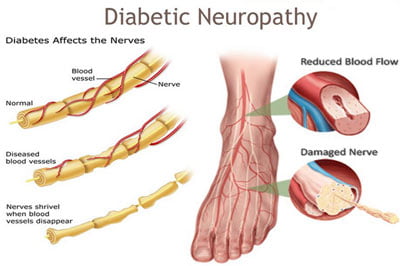Diabetes brings with it some severe medical issues. One of them is the risk of diabetic neuropathy. A significant increase in blood sugar — for diabetics and pre-diabetics — can cause nerve damage in different parts of your body. That makes diabetic neuropathy a dangerous medical condition. Protect yourself and live a long life by visiting the nationally recognized pain doctors at Pain Management NYC.
Nerve pain as a result of diabetes is called diabetic neuropathy. When your blood sugar gets dangerously high, it has the potential to damage nerves throughout your body. Most commonly, this damage occurs in your extremities, especially your feet and legs. It requires medical attention from the team at our Pain Center NYC.
Diabetic neuropathy is a serious complication of diabetes. Careful monitoring and control of your blood sugar can slow — or in some cases, prevent — diabetic neuropathy altogether. A healthy diet and lifestyle choices can help you maintain full use of your limbs, prevent diabetes and improve your quality of life.
Types of Neuropathy
Diabetic neuropathy can mimic the symptoms of peripheral neuralgia. Adding to the complications, there are four primary types of diabetic neuropathy:

- Peripheral neuropathy
- Radiculoplexus neuropathy
- Autonomic neuropathy
- Mononeuropathy
You can suffer from one or more types at the same time. Each type presents in different ways. So this single condition can cause a variety of symptoms. Since there are so many potential symptoms for this condition, it’s necessary for your pain doctor in NYC to run several tests to properly diagnose your condition from among the four types of neuropathy.
Peripheral Neuropathy
Peripheral neuropathy is by far the most common and the most closely associated with diabetic neuropathy. It’s exceptionally uncomfortable to live with. Peripheral neuropathy damages the nerves in your feet and legs first. Untreated, it can spread to your arms and hands. Symptoms include:
- Bouts of dizziness and an overall decrease in coordination
- Shooting pain or sharp cramps
- Touch sensitivity to the point that even clothing against your skin feels unbearable
- Loss of temperature sensitivity and awareness of other environmental changes
- Lost reflexes in your lower extremities
- Bone and joint pain, especially in your feet
- Increased risk of infections or sores
Your symptoms may get worse at night, making it difficult to sleep. An intense numbness that produces burning and tingling sensations can keep you awake. Don’t let it continue. Seek chronic pain management doctors near me, and you’ll find Pain Management NYC.
Radiculoplexus Neuropathy
Radiculoplexus neuropathy is more common if you have Type 2 diabetes. It also tends to affect older adults more. This neuropathy targets the nerves in your hips, buttocks, thighs and legs. The pain you experience from this neuropathy can be severe. In fact, it’s often mistaken for sciatica.
Unexplained weight loss can be an early indication of radiculoplexus neuropathy. Some cases can also cause swelling in your abdomen. If you notice that you’re having difficulty standing up from a seated position, it may signal muscle atrophy in your thighs, a sign of neuropathy.
Autonomic Neuropathy
Autonomic neuropathy affects your nervous system that controls your involuntary responses. The clearest example of this is your heart. You don’t consciously tell your heart to beat.
Your nervous system connects every part of your body. Autonomic neuropathy has so many symptoms that you need to visit the best pain management clinic in New York to get an accurate diagnose. Some symptoms include:
- Increased hypoglycemia risks, because your body can’t gauge your sugar levels
- Urinary bladder infections, bladder trouble, urine retention or incontinence
- Diarrhea or constipation
- Increased sensitivity
- Trouble swallowing
- Noticeable change in how your eyes adjust to light
- Blood pressure drops
- Lowered sexual response, including vaginal dryness and erectile disfunction
Mononeuropathy
Mononeuropathy specifically involves damage to a facial nerve, a leg nerve or a nerve in your abdomen. While this painful type of neuropathy is more common in older adults, it doesn’t cause any long-term effects to your body. Symptoms for mononeuropathy typically pass quickly, even without treatment. The condition causes pain in your foot, shin, thigh, chest or abdomen.
Mononeuropathy can also affect your eyes. If you notice eye pain, bouts of double vision or difficulty focusing, visit the best pain specialist in Manhattan. Untreated, it can lead to facial paralysis, such as Bell’s palsy.
What Are Effective Treatments for Diabetic Neuropathy?
The main goal of painful diabetic neuropathy treatment is to relieve your symptoms while preventing further nerve damage. Pain Management NYC offers a range of treatment options, since different cases require a specific approach. Your neuropathy specialist determines the best treatment method for you based on your medical history, the severity of your symptoms and the results from diagnostic tests. Effective treatments for diabetic neuropathy include:
- Medical therapies. These treatment methods relieve your immediate pain and improve your nerve function. These include:
- Spinal cord stimulation, such as Nevro HFX, the newest treatment for long-term relief
- Neurostimulation techniques
- Peripheral nerve stimulation
- Dorsal root ganglion stimulation
- Nerve blocks
- Stem cell therapy
- Medications. There are some medications that reduce the discomfort caused by painful diabetic neuropathy. Medications — such as anti-seizure drugs, antidepressants, pain relievers and topical creams — may help, but long-term use leads to unwanted side effects like the inability to concentrate or stay alert.
- Physical therapy. To improve your muscle strength, balance and mobility, try physical therapy. It prevents complications like foot ulcers and infections. Your physical therapist also teaches you how to use assistive devices, such as braces or splints, if needed.
While diabetic neuropathy has no cure, it’s possible to slow its progression and manage your discomfort. Keeping your blood sugar within healthy limits plays a major role in slowing the condition. A happy and comfortable life are possible even with severe diabetes. Let your pain management in New York clinic help you achieve it. Contact Pain Management NYC today.

Boleslav Kosharskyy, MD, is a top-rated, best-in-class interventional pain management doctor. He is board-certified in Anesthesiology, Interventional Pain Medicine, and Palliative Care.
Dr. Kosharskyy is an Associate Professor of Anesthesiology and Rehabilitation Medicine at Albert Einstein Medical College. He’s also the Associate Medical Director of Pain Medicine and Director of Anesthesia for the Joint Replacement Center at Montefiore Medical Center and Albert Einstein Medical College.
He is an active member of the American Society of Anesthesiology (ASA), the American Society of Regional Anesthesia and Pain Medicine (ASRA), and the New York State Society of Anesthesiologists (NYSSA)
